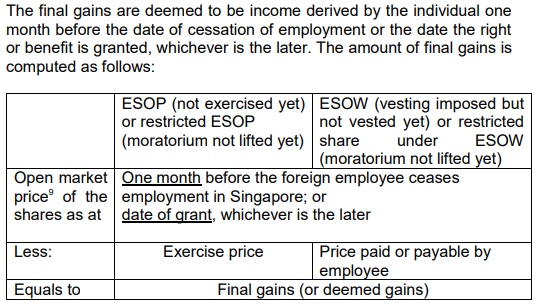In this article I will talk about how the US treats stock options then I will talk about Singapore. The contradiction between the 2 jurisdictions would be clear. Many US exposed persons working in Singapore encounter this problem. The key issue is the deemed exercise rule. There is not much an employee can do about this rule. The most that can be done is defer the paying of the tax for some years, but the Singapore employer assumes the risk (more about US expat tax Singapore in this guide) and the employee is liable for interest.
USA
Under US law, if you receive an option to buy stock as
payment for your services, you may have income when you receive the option,
when you exercise the option, or when you dispose of the option or stock
received when you exercise the option. There are two types of stock options:
- · Options granted under an employee stock purchase
plan or an incentive stock option (ISO) plan are statutory stock options. - · Stock options that are granted neither under an
employee stock purchase plan nor an ISO plan are nonstatutory stock
options.
Statutory Stock Options
If your employer grants you a statutory stock option, you
generally don’t include any amount in your gross income when you receive or
exercise the option. However, you may be
subject to alternative minimum tax in the year you exercise an ISO. You have taxable income or deductible loss
when you sell the stock you bought by exercising the option. You generally treat this amount as a capital
gain or loss. However, if you don’t meet special holding period requirements,
you’ll have to treat income from the sale as ordinary income. Add these amounts, which are treated as wages,
to the basis of the stock in determining the gain or loss on the stock’s
disposition. Refer to Publication 525 for specific details on the
type of stock option, as well as rules for when income is reported and how
income is reported for income tax purposes.
- · Incentive Stock Option – After exercising
an ISO, you should receive from your employer a Form
3921.pdf, Exercise of an Incentive Stock Option Under Section 422(b).
This form will report important dates and values needed to determine the
correct amount of capital and ordinary income (if applicable) to be reported on
your return. - · Employee Stock Purchase Plan – After your
first transfer or sale of stock acquired by exercising an option granted under
an employee stock purchase plan, you should receive from your employer a Form
3922.pdf, Transfer of Stock Acquired Through an Employee Stock
Purchase Plan under Section 423(c). This form will report important dates and
values needed to determine the correct amount of capital and ordinary income to
be reported on your return.
Nonstatutory Stock Options
If your employer grants you a nonstatutory stock option, the
amount of income to include and the time to include it depends on whether the
fair market value of the option can be readily determined.
- · Readily Determined Fair Market Value – If
an option is actively traded on an established market, you can readily
determine the fair market value of the option. Refer to Publication
525 for other circumstances under which you can readily determine the
fair market value of an option and the rules to determine when you should
report income for an option with a readily determinable fair market value. - · Not Readily Determined Fair Market Value – Most
nonstatutory options don’t have a readily determinable fair market value. For
nonstatutory options without a readily determinable fair market value, there’s
no taxable event when the option is granted but you must include in income the
fair market value of the stock received on exercise, less the amount paid, when
you exercise the option. You have taxable income or deductible loss when you
sell the stock you received by exercising the option. You generally treat this
amount as a capital gain or loss. For specific information and reporting
requirements, refer to Publication 525.
—————–
Singapore
For shares granted on or after 1 Jan 2003 under any ESOP (employee
share options) or ESOW (other Employee Share Ownership) plans, the gain derived
from the plans is taxable if the individual is granted the options or shares
while he is exercising employment in Singapore.
Where there is a moratorium on shares granted under any ESOP
or ESOW plans, the taxable options or shares derived by individual will only
constitute gains accruing to him on the date the moratorium is lifted. Generally, the amount of taxable gains or
profits is the difference between the open market price of the shares at the
time of exercising/accruing/vesting of the ESOP/ESOW and the amount paid by the
individual for such shares. As a tax
deferral scheme, QEEBR (Qualified Employee Equity-based Remuneration Scheme) was
introduced in 1999 to ease the cash flow problems faced by some employees who
do not sell their shares after exercising the option. Under this scheme, the payment of tax arising
from stock option gains can be deferred for up to 5 years with interest charge.
What concerns most foreigners working in Singapore is the deemed
exercise rule. It applies when a
foreigner ceases employment or Singapore Permanent Residents (“SPRs”) leave
Singapore permanently. Under the rule, the final gains from unexercised ESOPs,
or other relevant ESOPs or ESOWs are deemed to be income derived by the
individual one month before the date of cessation of employment or the date the
right or benefit is granted, whichever is the later.
As an alternative to the “deemed exercise” rule and subject
to certain conditions, employers are allowed to track when the “income
realization event” of the foreign employee occurs. The “income realization event” refers to the
following:-
- · when the foreign employee exercises options that
were unexercised; or - · when the shares acquired under any ESOP plan are
no longer subject to any restriction; or - · when the shares under any ESOW plan that were
unvested or restricted at the time he ceases employment in Singapore become
vested or are no longer subject to any restriction.
In this scenario, the employer takes responsibility for
collecting and remitting the taxes due. For the employer to do this, they must meet several criteria including
being Singapore incorporated, have adequate systems for tracking, meet
capitalization requirements, and have an excellent tax paying record for the
past 3 years.





